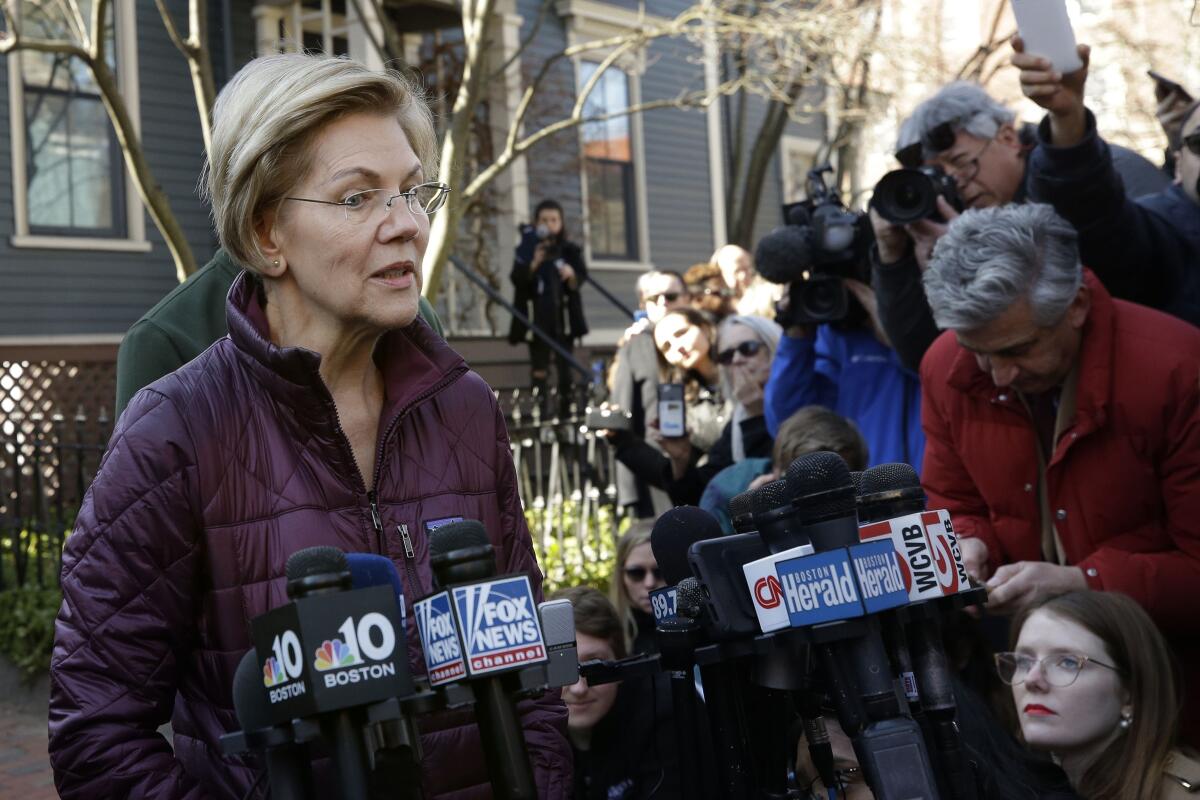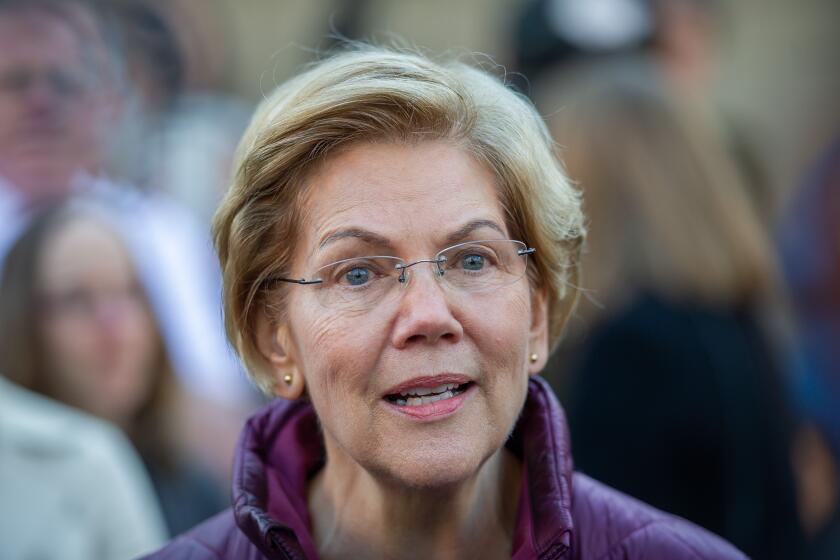Elizabeth Warren drops out of presidential race

- Share via
WASHINGTON — Sen. Elizabeth Warren dropped out of the presidential race Thursday, ending a 14-month campaign to bring “big structural change” to the U.S. that failed to win a single primary. In the coming days she faces a decision on how to use her remaining leverage and whether to endorse one of her remaining rivals, a move that could help shape the next phase of the battle for the 2020 nomination.
The architect of a campaign that for some time galvanized progressives and women before floundering, Warren ultimately failed in her effort to unite the Democratic Party’s left and right behind her ambitious, detailed policy agenda.
If she endorses the race’s leading progressive — Sen. Bernie Sanders — she could help an ideological ally consolidate the party’s left wing at a time when its establishment is rallying behind former Vice President Joe Biden. If she backs Biden, she could be a bridge to the left in service of uniting the party.
People close to Warren said she may choose to do neither and try instead to find other ways to advance her ideas.
A key question is whether she will make a decision known before Tuesday, when the next round of primaries are held — including in Michigan, a delegate-rich state that is particularly important for Sanders.
“Let’s take a deep breath and take a little time with that,” she said at a news conference outside her home in Cambridge, Mass., when asked which candidate she would endorse. “We don’t have to decide at this minute.”
Warren was the fifth Democrat to bow out of the volatile 2020 contest in less than a week. Her departure whittles the field to two white male front-runners. It is a remarkable conclusion for a race that began with more than two dozen candidates running, including six women and five people of color.
Asked if she believed gender was a factor in her repeated losses, Warren called that a “trap question for every woman” in politics.
“If you say, ‘Yeah, there was sexism in this race,’ everyone says, ‘Whiner!’” she said. “And if you say, ‘No, there was no sexism,’ about a bazillion women think, ‘What planet do you live on?’“
Reflecting on why she thought her campaign did not end up garnering more support Warren said she found no political opening between the established candidates of the party’s left and center.
“I was told at the beginning of this whole undertaking that there are two lanes — a progressive lane that Bernie Sanders is the incumbent for and a moderate lane that Joe Biden is the incumbent for, and there’s no room for anyone else in this,” Warren said. “I thought that wasn’t right, but evidently I was wrong.”
Warren spoke to Biden and Sanders in separate phone calls Wednesday.
For many women, Elizabeth Warren dropping out of the presidential race was a familiar punch to the gut. The highest glass ceiling in the land remains intact.
She will face heavy pressure from Sanders’ backers to support him against Biden, who saw his campaign surge into the lead Tuesday after rapid consolidation of support from moderates and African Americans, the Democratic establishment and others who worry that Sanders is too far left to beat President Trump.
Warren has a longstanding friendship and ideological kinship with Sanders. But she is also a pragmatic politician who wants Trump defeated and whose top priority is advancing her ambitious agenda.
Biden was the beneficiary of one of Warren’s most important accomplishments this year. Her evisceration of billionaire Michael R. Bloomberg in recent debates effectively sidelined one of Biden’s biggest threats, and the former New York mayor quit the race Wednesday.
The rich, brainy city of Cambridge, Mass., reflects Elizabeth Warren’s have-a-plan approach as well as inequality issues at the center of her campaign.
It is not clear that all of Warren’s backers would go to Sanders if she did endorse him. She has attracted many older, suburban supporters who may be more comfortable with Biden’s calls for more traditional Democratic reforms. But one Sanders strategist said that if just 60% of her supporters became Sanders backers, “it would be a game changer.”
The senior senator from Massachusetts was one of the first Democrats to enter the 2020 race and briefly led the field last year, but she experienced crushing defeats in the first states to vote and could not recover. She ultimately suffered an embarrassing third place finish in her home state on Super Tuesday.
A powerful voice in progressive politics even before she was elected to the Senate in 2012, Warren had courted mainstream Democrats with an impassioned plea for “big structural change.” She offered detailed policy plans backed by a fervent promise to fight for them without apology.
Had she run in 2016, which she considered doing, Warren might have kept the progressive wing of the party to herself. Sanders emerged as a national figure instead by challenging Hillary Clinton and building a powerful fundraising network and a campaign organization that he carried to 2020.
This time, Sanders’ prominence forced Warren to embrace his signature proposal, so-called “Medicare for all,” a politically fraught issue that many progressives view as a litmus test — but that some moderates view with alarm.
After declining to outline a healthcare plan of her own for months, Warren proposed one in November that would cost taxpayers nearly $20 trillion over a decade, according to her own estimates.
Weeks later, she attempted to alleviate moderates’ fears by releasing a second plan that called for a phased-in approach that would preserve private insurance until her third year in office.
Instead of splitting the difference, Warren seemed to lose voters on both sides, starting a steady slide in the polls.
Those hurdles were compounded by concerns, which her supporters viewed as sexist, that Warren would repel white working-class voters who helped tip the 2016 election for Trump against Clinton.
Sanders, who avoided explaining how he would pay for universal healthcare, benefited from Warren’s stumbles, overtaking her as the leading progressive candidate in the race.
Even as Warren exits the campaign, her mark on the party has been indelible.
She and Sanders pushed rivals to embrace more liberal healthcare proposals, anticorruption measures, reparations for African Americans and more generous policies aimed at reducing the burden of college debt.
Her proposal for a 2% tax on the ultra-wealthy, to help fund many of her social programs, was popular on the campaign trail, prompting supporters to chant “two cents” at her rallies.
Warren, 70, came to politics late in life. But she attracted widespread notice when she designed a consumer financial protection agency for President Obama after the 2007-09 financial crisis and Great Recession.
As a candidate, she put complex financial issues into plain language that some critics viewed as overly simplistic. But she channeled the left’s growing populist yearnings with an uncompromising attack on Wall Street tycoons and other elites who she believed had an undue influence on the Democratic Party and the country as a whole.
Though foes painted the former professor as out of touch with average Americans, she had a modest upbringing in Oklahoma that she frequently invoked on the campaign trail.
Trump taunted Warren as “Pocahontas,” mocking her assertions of Cherokee heritage before she joined politics, claims that dogged both her Senate and presidential campaigns. After taking a DNA test in 2018, she apologized for making such claims.
Warren appeared to win over voters who appreciated her ability to field hard questions, her patience in taking cellphone pictures with long lines of supporters, and making endless “pinkie swears” to help inspire young girls that they too should run for president.
“This isn’t just about me, this is about a whole lot of people,” Warren said Thursday in Cambridge. “I take those pinkie promises seriously.” She also said “one of the hardest parts” was the message her departure sent to the girls she met on the campaign trail.
“All those little girls are going to have to wait four more years,” she said.
More to Read
Get the L.A. Times Politics newsletter
Deeply reported insights into legislation, politics and policy from Sacramento, Washington and beyond. In your inbox three times per week.
You may occasionally receive promotional content from the Los Angeles Times.













